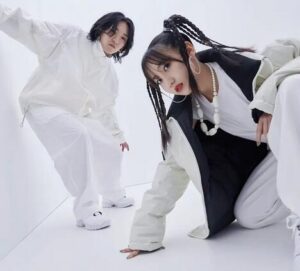 Introduction
Introduction
Artist: YOASOBI
Songname: Monotone(モノトーン )
YOASOBI is set to perform the theme song “Monotone” for the animated film “Fureru.,” which will be released on October 4th. This marks their first foray into creating a theme song for an animated film, with the song inspired by a novel written by the film’s scriptwriter, Okada Mari. The film is directed by Nagai Ryusei and features character design by Tanaka Masakatsu. It tells the story of three childhood friends and a mysterious creature, exploring the true connections between people in a complex modern world.
The main characters are voiced by talented actors Ryo Nishikido, Ryuta Sato, and Kentaro Nakamoto. A trailer and key visual have been released in anticipation of the film’s premiere, and YOASOBI is excited for the audience’s anticipation and enjoyment of both the movie and their song.
Translation
| Original | Translation | ||
|---|---|---|---|
| 1 | 僕は | 1 | I |
| 2 | 僕らは | 2 | We |
| 3 | ひとりきりの世界を生きている | 3 | Living alone in the world |
| 4 | 隣り合う世界にそっと触れる度 | 4 | The degree to which one touches the next world |
| 5 | 思い知るんだ | 5 | I know |
| 6 | 思い出すんだ | 6 | I remember |
| 7 | ああ | 7 | Ah |
| 8 | 8 | ||
| 9 | 幼い頃の僕らは | 9 | When we were young |
| 10 | 模写義者に守れたまま | 10 | To be protected by the copyrighter |
| 11 | 呼び合う名前と明日の約束 | 11 | Calling names and tomorrow’s promise |
| 12 | それだけで世界は一つだと思ってた | 12 | I thought that the world was only one |
| 13 | 分かり合えないことが | 13 | Impossible to understand |
| 14 | 許し合えないことが | 14 | Not permitted |
| 15 | 一つ二つ増えてく | 15 | To increase one or two |
| 16 | その度に僕は | 16 | At that time I |
| 17 | 信じ合えると期待することさえも | 17 | Even to expect to believe |
| 18 | やめてしまった | 18 | I have quit |
| 19 | 19 | ||
| 20 | ずっと | 20 | All along |
| 21 | 僕が | 21 | I |
| 22 | 僕らが | 22 | We |
| 23 | それぞれ別の世界を生きてる | 23 | Living in another world |
| 24 | 近づいたと思えば | 24 | If you think |
| 25 | 離れ離れに | 25 | Apart from |
| 26 | そう繰り返す度 | 26 | Degrees repeat |
| 27 | 「あ、ひとりきり」を思い知るんだ | 27 | “I know one,” |
| 28 | 僕は | 28 | I |
| 29 | 僕らは | 29 | We |
| 30 | それでも誰かを求めるのは | 30 | Still asking someone |
| 31 | 孤独をただ素直に受け入れたまま | 31 | Just accept solitude |
| 32 | 生きていけるほど大人じゃないから | 32 | Because it is not an adult |
| 33 | ああ | 33 | Ah |
| 34 | 34 | ||
| 35 | 教室の後ろに貼られた | 35 | Stuck behind the classroom |
| 36 | 近色で絵描かれた | 36 | I was painted in the near color |
| 37 | 同じ景色たち | 37 | The same scenery |
| 38 | 僕らは誰もが | 38 | All we have |
| 39 | それぞれで違う | 39 | Different |
| 40 | 少しのズレもなく | 40 | Without a trace |
| 41 | 重なり言葉のあまり | 41 | Too much words |
| 42 | 描いていた理想からどれだけ | 42 | From the ideal of drawing |
| 43 | 離れているかね測るような | 43 | Measuring a distance |
| 44 | あいに見せた独りよがりは | 44 | He is a good fellow |
| 45 | 行き過ぎてない物ねだり | 45 | Something that is not too far |
| 46 | 確かめる度嫌になって | 46 | Sure to become unpleasant |
| 47 | 求める度に勝手になって | 47 | At once |
| 48 | 失う度臆病になった | 48 | I lost my heart |
| 49 | 今より多くは望まないから | 49 | Because I don’t want more now |
| 50 | 50 | ||
| 51 | そうやって曖昧な興味を保つ言葉 | 51 | A word that is vague |
| 52 | 大人になることだと思い込んだ | 52 | I thought it would be an adult |
| 53 | 僕は | 53 | I |
| 54 | 偒付くことから逃げてるだけで | 54 | Just escape from the attachment |
| 55 | ほんどはただ | 55 | Really |
| 56 | 今でもまた | 56 | Even now |
| 57 | 信じたいんだ | 57 | I want to believe |
| 58 | 58 | ||
| 59 | ずっと | 59 | All along |
| 60 | 僕は | 60 | I |
| 61 | 僕らは | 61 | We |
| 62 | 誰もが別の世界を生きてる | 62 | Everyone lives in another world |
| 63 | だから手を繋いて | 63 | So I tied hands |
| 64 | そう言葉を交わして | 64 | With words |
| 65 | ひとりきりではないと | 65 | Not alone |
| 66 | お互いに誤魔化し合うんだ | 66 | We mistook each other |
| 67 | 67 | ||
| 68 | いっか | 68 | Either |
| 69 | この未熟な孤独に包まれて | 69 | Wrapped in this immature loneliness |
| 70 | 覚えた寂しさと痛みの分だけ | 70 | Only loneliness and pain |
| 71 | 優しくなれたら | 71 | Be kind |
| 72 | 人を信じられたら | 72 | If you believe people |
| 73 | ずっと | 73 | All along |
| 74 | 君を | 74 | You |
| 75 | 「誰もがひとりだ」分かり合いたいと | 75 | Everyone wants to understand |
| 76 | 寄り添いあった心が触れるその時 | 76 | The time when a heart is touched |
| 77 | 一瞬この世界は一つに見えた | 77 | For a moment this world looked one |
Meaning
- Isolation and Individuality:
- The singer expresses a sense of living in their own individual world, separate from others (“僕は/僕らは/ひとりきりの世界を生きている” – “I/We live in our own solitary world”).
- As they come into contact with the ‘worlds’ of others, they realize the deep-seated differences and the inherent solitary nature of existence.
- Realization and Memory:
- The realization of this isolation makes the singer recall the innocence and simplicity of childhood, when they believed that merely sharing names and promises created a unified world.
- Disillusionment and Withdrawal:
- As understanding and tolerance decrease over time (“分かり合えないことが/許し合えないことが”), the singer loses hope in mutual trust and connection and eventually withdraws from expecting such bonds.
- Desire for Connection:
- Despite recognizing their solitary nature, the singer and others still yearn for connection (“それでも誰かを求めるのは/孤独をただ素直に受け入れたまま/生きていけるほど大人じゃないから”).
- Shared Yet Divergent Perceptions:
- The imagery of classroom drawings represents how everyone sees the world differently. Even when drawing the same scene, each person’s interpretation and perception are unique.
- Struggles and Acceptance:
- The singer grapples with the balance between accepting this divergence and the inherent desire to connect and understand each other (“独りよがりは/行き過ぎてない物ねだり”).
- Growth and Compassion:
- Through experiencing loneliness and pain, the singer aspires to become kinder and more trusting (“覚えた寂しさと痛みの分だけ/優しくなれたら/人を信じられたら”).
Conclusion and Hope
- In the end, despite recognizing the inherent solitude of each individual, the singer cherishes moments of connection where two hearts touch, and the world momentarily feels unified (“一瞬この世界は一つに見えた”).
Overall Message:
The lyrics delicately articulate the paradox of human existence: while we each live in our own isolated worlds, the yearning for connection and understanding persists. The singer acknowledges this duality but holds onto the hope that moments of genuine connection can transcend the inherent isolation.
